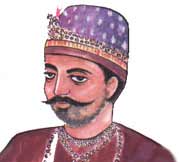

 |  |
 In the summer of 1857 the massed clouds burst and the entire British dominion in India shook to its foundation. On 10th May, 1857 the rebellion started in Meerut cantonment 36 Km from Delhi. Gradually it spread towards Punjab in North, Narmada in South, Rajputana in West and Bengal in East. In Meerut Indian soldiers killed there British seniors and then marched towards Delhi. Next morning the soldiers of Delhi joined their Meerut counterparts they took over the city and crowned aged Mughal Bahadur Shah Jafar as the Emperor of India. Soon various displaced Taluqdars, Jamindars and Kings started participating in the revolt, which had by now become a revolution. They declared their allegiance to Bahadur Shah Jafar.
In the summer of 1857 the massed clouds burst and the entire British dominion in India shook to its foundation. On 10th May, 1857 the rebellion started in Meerut cantonment 36 Km from Delhi. Gradually it spread towards Punjab in North, Narmada in South, Rajputana in West and Bengal in East. In Meerut Indian soldiers killed there British seniors and then marched towards Delhi. Next morning the soldiers of Delhi joined their Meerut counterparts they took over the city and crowned aged Mughal Bahadur Shah Jafar as the Emperor of India. Soon various displaced Taluqdars, Jamindars and Kings started participating in the revolt, which had by now become a revolution. They declared their allegiance to Bahadur Shah Jafar.Soon all over north this revolt got transformed into a mass movement. Common man fought with Axes, Spears, Bows & Arrows, Sticks and local rifles. Especially the farmers and labourers of today's Bihar and Uttar Pradesh participated in the revolt in large number and gave it strength. According to estimates a total of 1.5 lakh person from Awadh region and 1 lakh person from Bihar died while fighting with the British troops. The main feature of the mutiny was that there was a perfect harmony between Hindus and Muslims, for example the rebels had declared Bahadur Shah Jafar, a Muslim, as their leader and wherever they went they banned cow-slaughter as a respect for Hindu sentiments. British imperialism was at its top all over the world. Majority of Indian feudal chiefs and Kings helped them against there own fellow countrymen. As such the British army was numerically stronger than the rebels. Among the rebels there was a lack of cohesiveness, discipline and a unified dedication. Before the rebels could overcome their faults the British government used their supreme power and equipments to crash the revolt brutely. On 20th September 1857, the British finally arrested Bahadur Shah Jafar and the rebels lost to the British fighting one by one. Nana Sahib was defeated at Kanpur. One of his faithfull General Tantya Tope continued the guerilla war with esteemed valour and commitment until April, 1859. But he became a victim of deceit by one of his trusted lieutenant. The Rani of Jhansi died bravely fighting with the Britishers on 17th June,1858. By 1859 Kunwar Singh of Bihar, Sepoy Bakht Khan leading the rebels of Delhi, Khan Bahadur Khan of Bareilly and Maulvi Ahmedullah of Faizabad had all died fighting. The Begum of Awadh had to flee to Nepal. By the end of year 1859 the British rule had re-established itself over the whole of India, but the revolt had not gone in vain. next page >> |
Copyright ©2000 indiansaga.info. All rights reserved.
By using this service, you accept that you won't copy or use the data given in this website for any commercial purpose.
The material on indiansaga.info is for informational & educational purpose only.
This site is best viewed at 800 X 600 picture resolution.